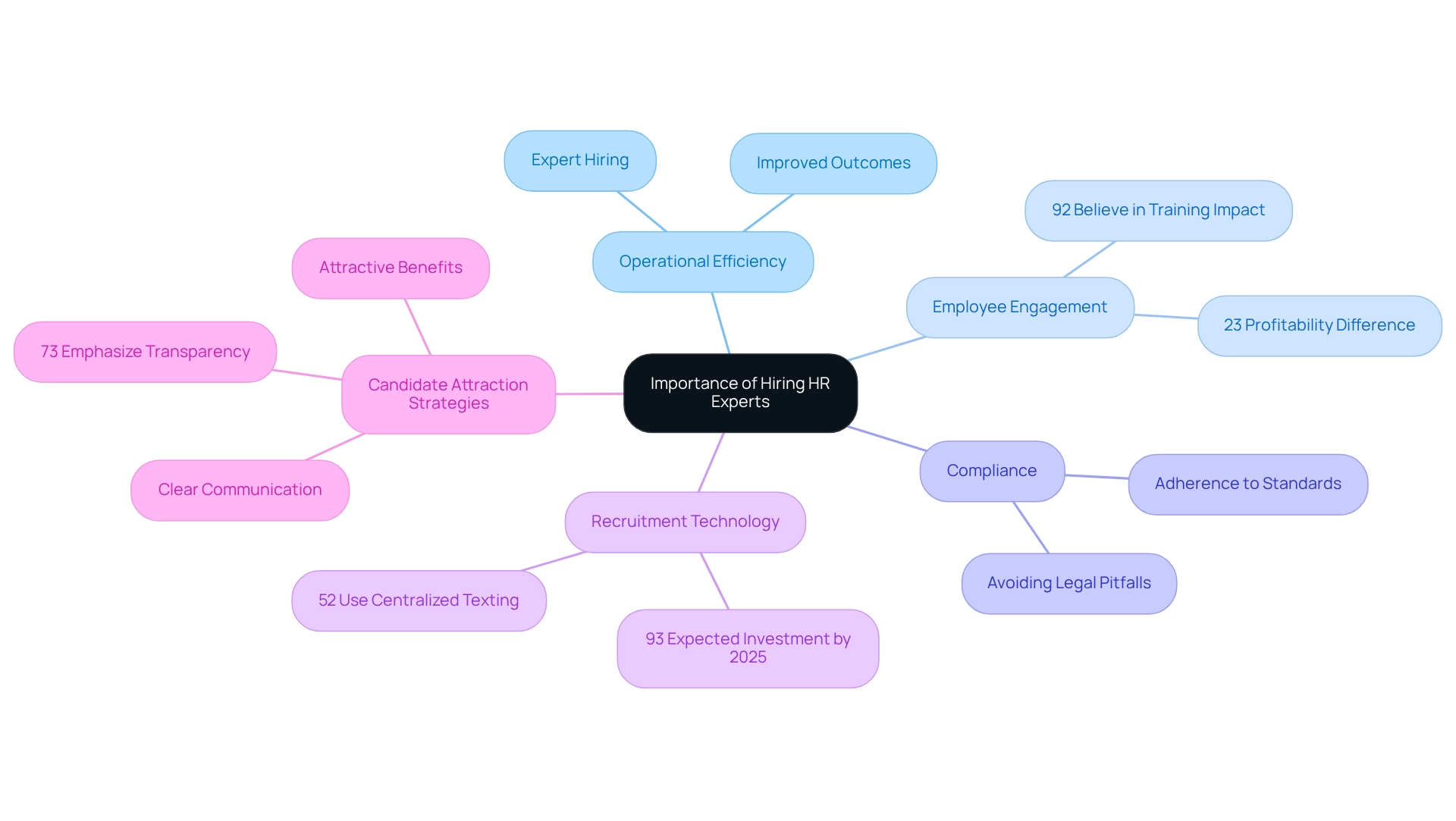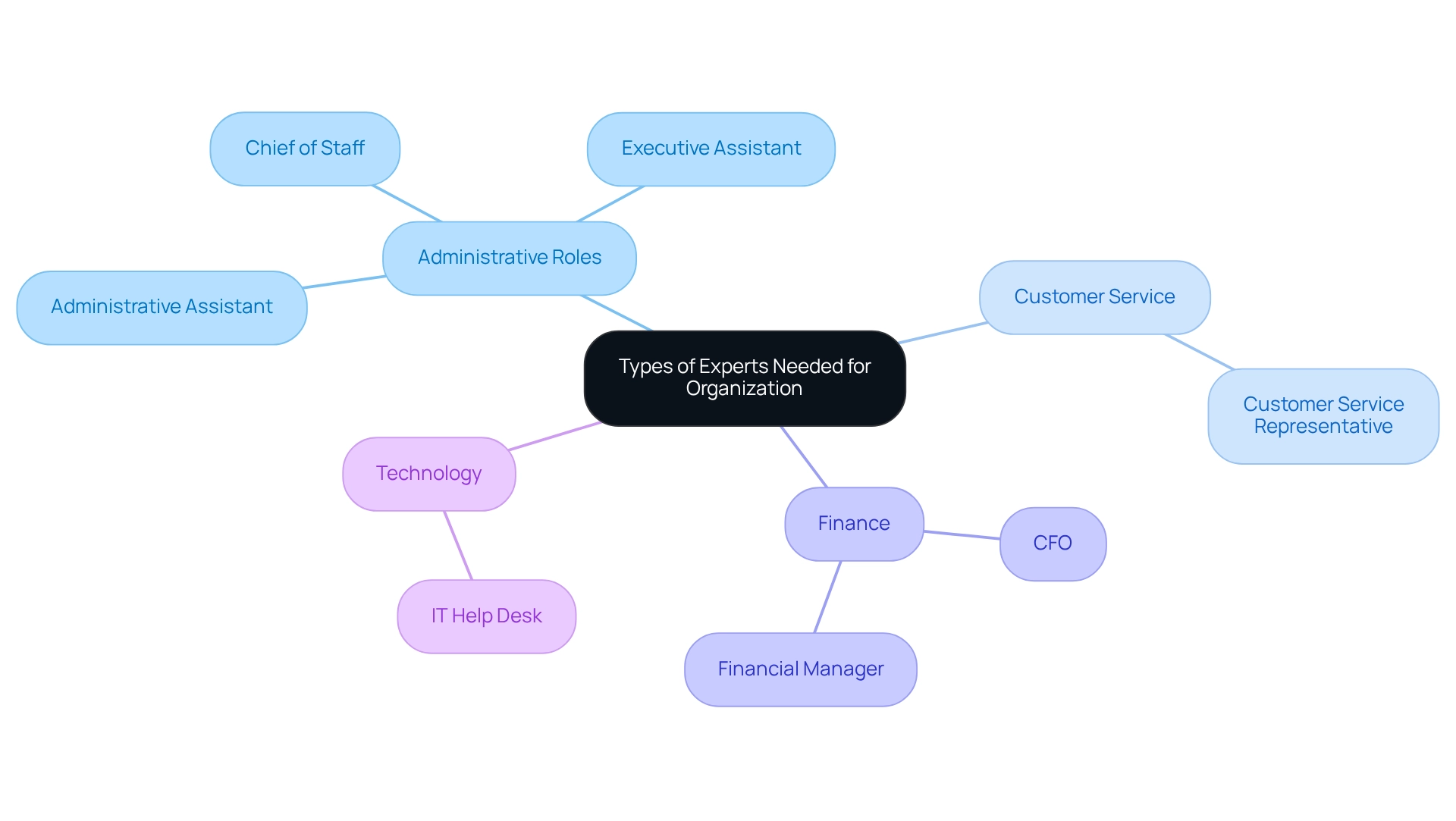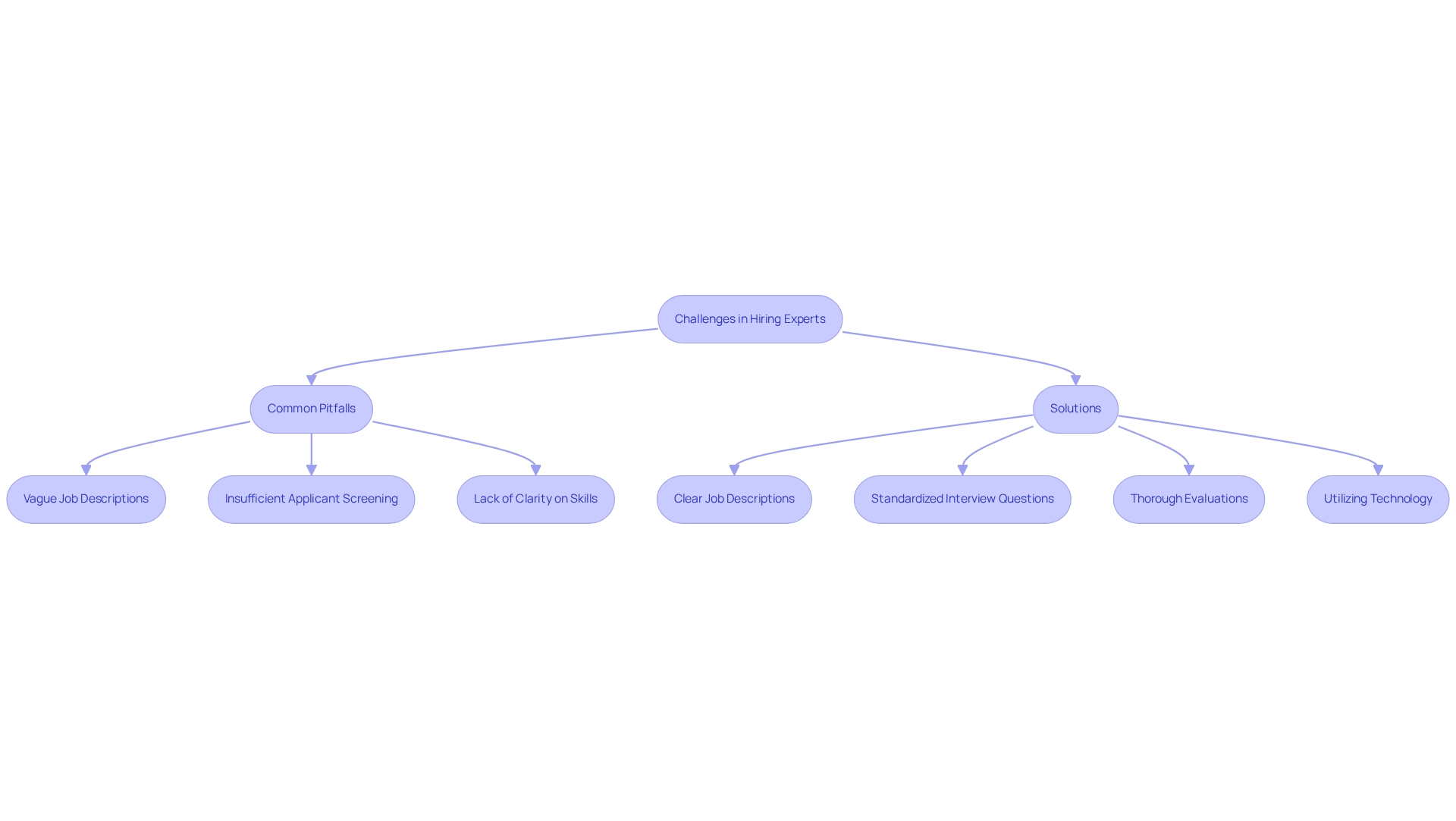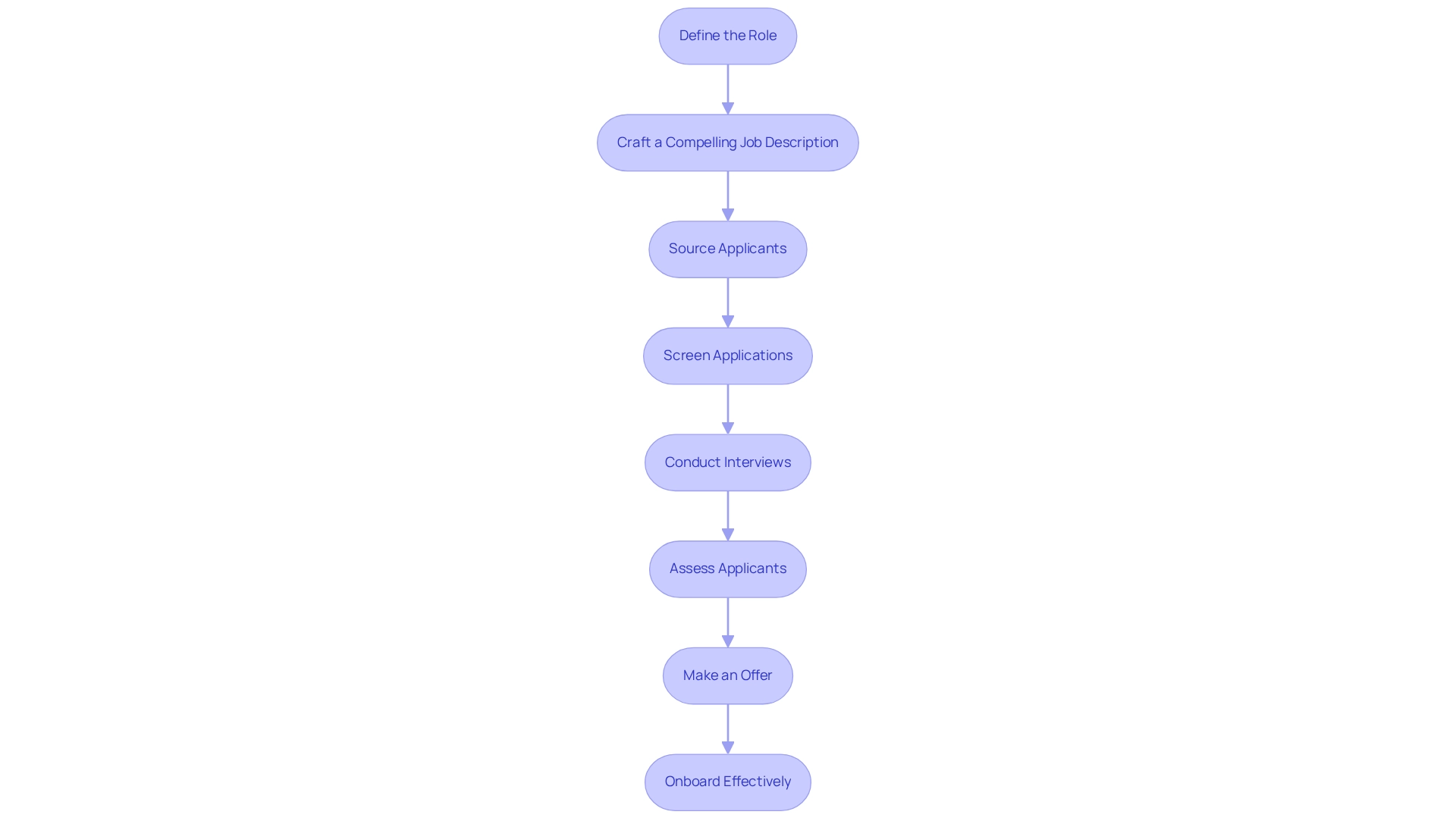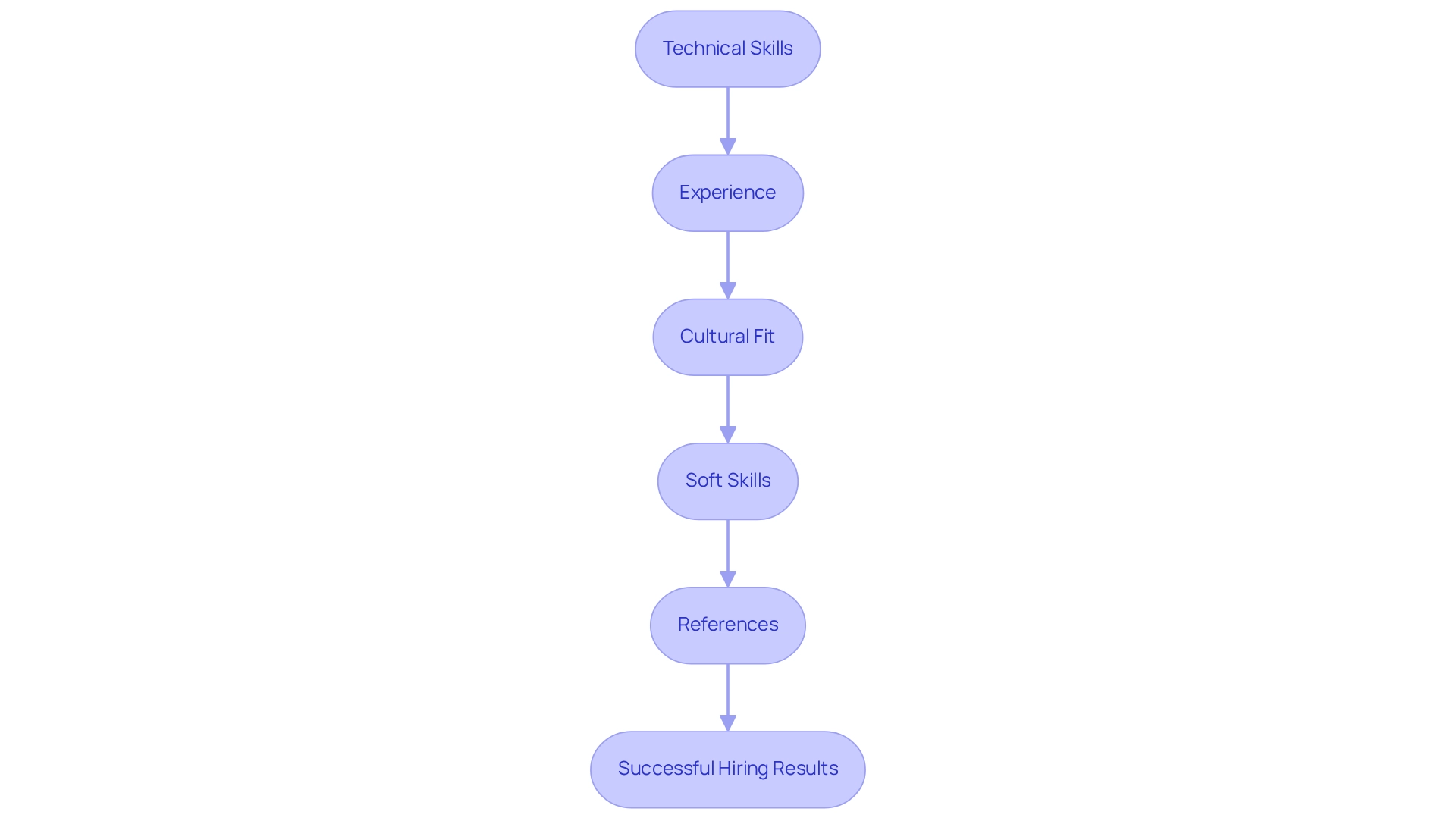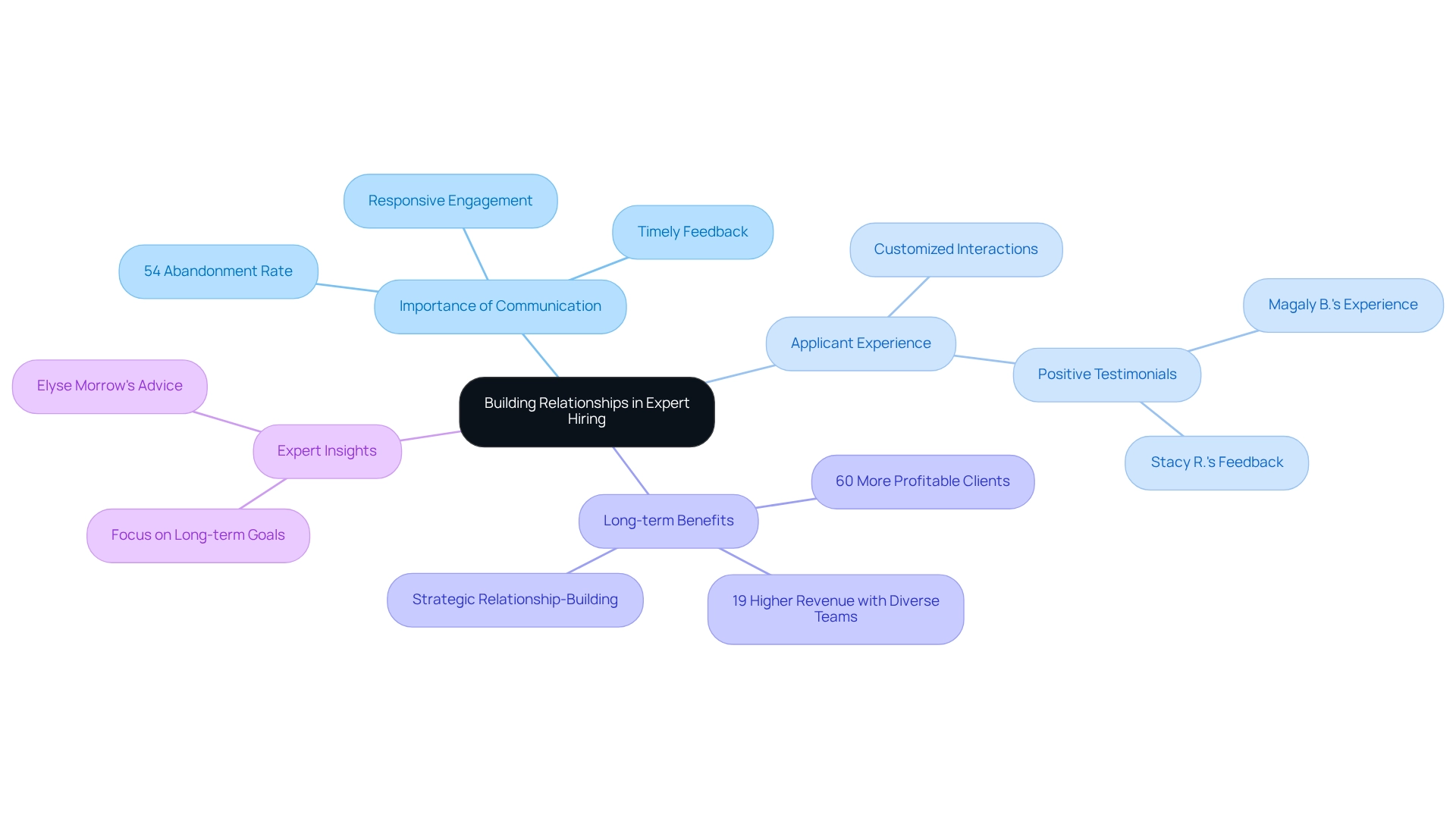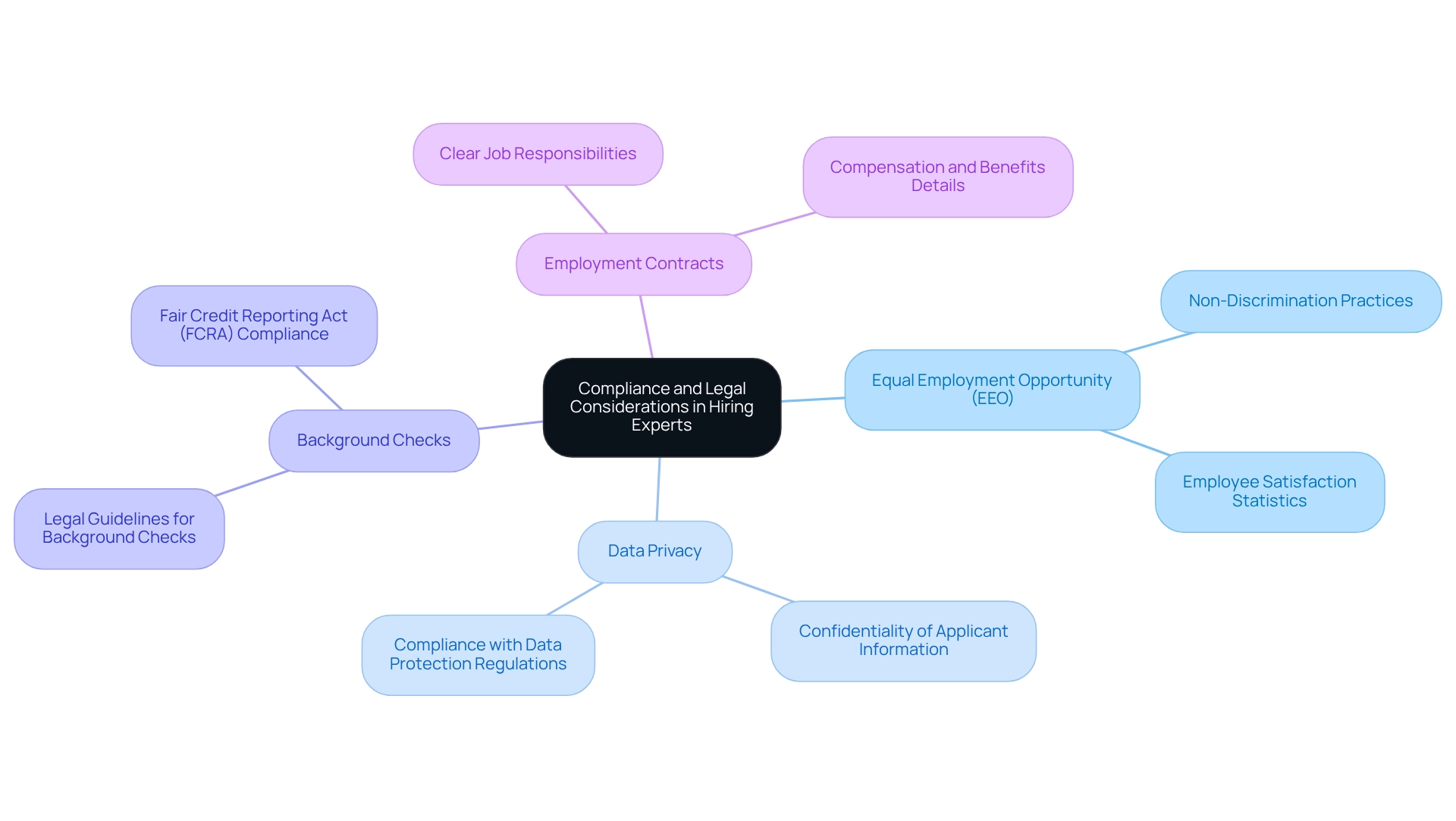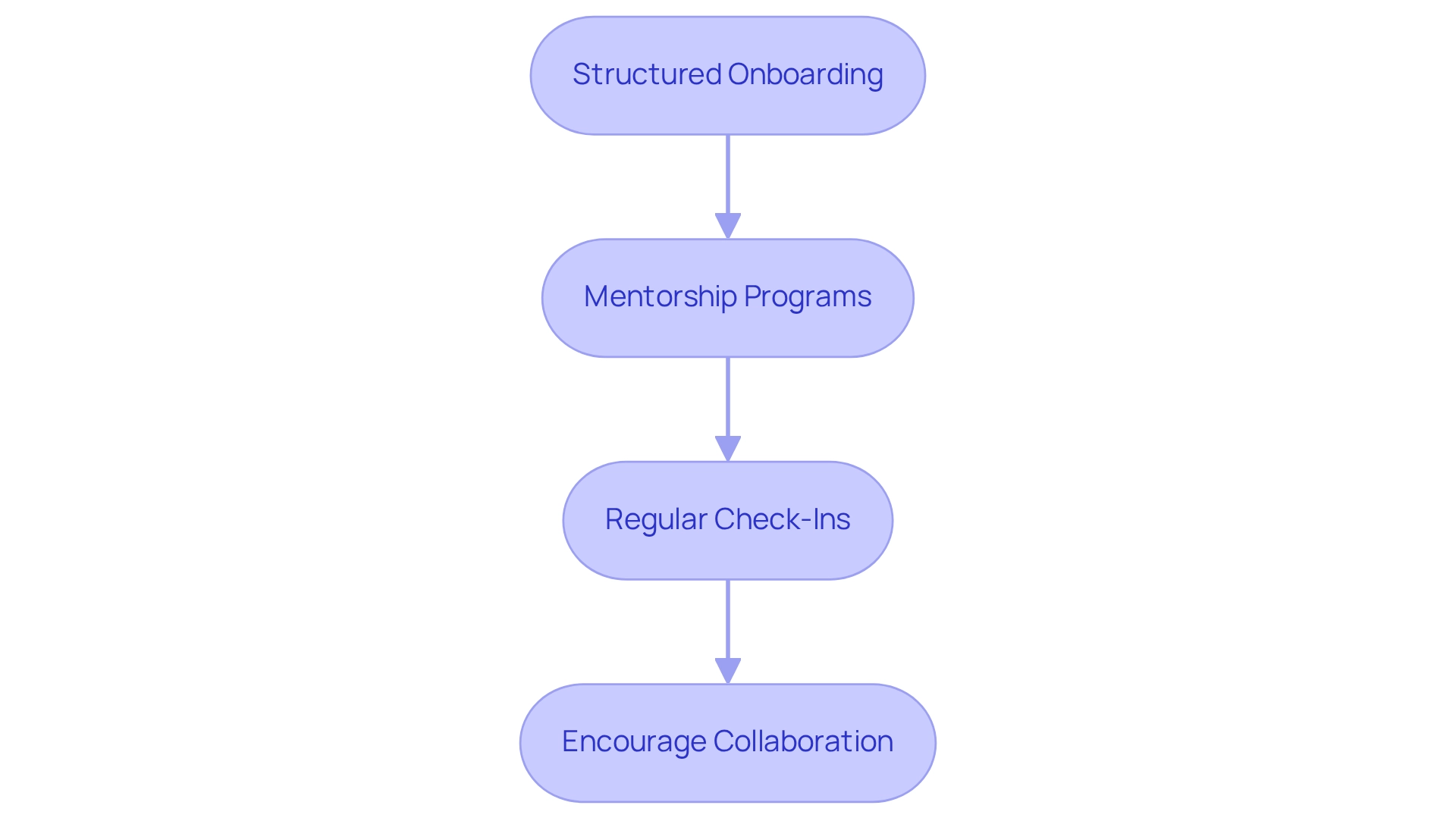Overview
The article presents a comprehensive step-by-step guide for HR managers, detailing how to effectively hire experts. It emphasizes the critical importance of structured processes, clear communication, and compliance with legal standards. Best practices are meticulously outlined, including:
- The crafting of precise job descriptions
- The utilization of technology for recruitment
- The implementation of effective onboarding strategies
These practices not only enhance candidate engagement but also significantly improve retention rates.
Key Highlights:
- Hiring HR experts is essential for improving operational efficiency and strategic direction within organizations.
- Specialized HR professionals enhance compliance, employee engagement, and overall business performance.
- Boutique Recruiting specializes in sourcing high-quality contract employees, ensuring standards are met across temporary and permanent hires.
- Research shows a 23% profitability difference between highly engaged teams and those with low engagement levels.
- Effective HR practices, such as clear communication and attractive benefits, are crucial for attracting candidates.
- By 2025, 93% of employers are expected to invest in recruitment technology, highlighting the growing demand for skilled HR specialists.
- Structured hiring processes, including clear job descriptions and standardized interview questions, mitigate common hiring pitfalls.
- Compliance with EEO, data privacy, and background check regulations is vital to avoid legal risks in hiring.
- Implementing effective onboarding practices can lead to a 50% higher retention rate for new hires.
- Building strong relationships with candidates through effective communication can enhance hiring outcomes and candidate acceptance rates.
Introduction
In the competitive landscape of talent acquisition, the significance of hiring specialized experts in human resources cannot be overstated. Organizations are increasingly recognizing that these professionals bring essential skills and insights that can transform operational efficiency and drive strategic initiatives.
Consider the complexities of modern recruitment technology and the critical role HR specialists play in shaping a company’s workforce. With the demand for skilled HR professionals on the rise, understanding the nuances of effective hiring practices becomes crucial for organizations aiming to attract and retain top talent.
This article delves into the multifaceted approach required to successfully integrate HR experts into teams, ensuring long-term success and adaptability in an ever-evolving market.
Understanding the Importance of Hiring Experts in HR
Entities aiming to enhance operational efficiency and strategic direction recognize that hiring experts in human resources is essential. These professionals bring a wealth of specialized knowledge and skills that can profoundly influence various facets of the business, including compliance and employee engagement. Boutique Recruiting excels in sourcing high-quality contract employees from a vast pool of pre-screened and pre-qualified talent, ensuring that even temporary staff uphold the same standards as permanent hires.
This commitment to quality is crucial for organizations seeking to bolster their HR capabilities across diverse industries. For instance, companies that prioritize clear communication and attractive benefits have demonstrated greater success in attracting candidates, as highlighted in the case study on candidate attraction strategies. This underscores the importance of effective HR practices. The influence of HR specialists extends beyond hiring; they play a vital role in nurturing a culture of engagement.
Research indicates a 23% difference in profitability between highly engaged teams and those with low engagement levels. This statistic emphasizes the necessity of hiring HR experts who can implement strategies that enhance employee satisfaction and retention. Furthermore, 92% of survey respondents believe that good formal workplace training positively impacts their engagement with their job, further reinforcing the role of HR in cultivating a productive workforce. Boutique Recruiting’s specialized HR hiring services include customized searches for key positions such as CHRO, Chief People Officer, and HR Director, ensuring that companies find the right fit for their unique needs.
As firms navigate increasingly complex challenges, the expertise of HR professionals becomes indispensable. With 93% of employers expected to invest in recruitment technology by 2025, the demand for skilled HR specialists will only grow. These experts are equipped to utilize technology efficiently, ensuring that companies remain competitive in a rapidly changing market.
Moreover, 52% of talent acquisition teams utilize centralized texting platforms for candidate communication, highlighting the significance of contemporary communication strategies in recruitment.
In addition to operational efficiency, employing HR specialists is essential for maintaining compliance with ever-changing regulations. Their specialized knowledge helps organizations avoid costly legal pitfalls and ensures adherence to industry standards. Ultimately, the strategic hiring of HR specialists not only enhances organizational efficiency but also drives innovation and adaptability.
Companies that have successfully integrated a hiring expert into their teams report improved employee engagement and operational outcomes, making a compelling case for the importance of expert hiring in today’s competitive landscape. Additionally, 73% of employers emphasize transparency in job descriptions, which is crucial for attracting the right talent.
Identifying the Types of Experts Needed for Your Organization
To effectively hire specialists, HR managers must first become hiring experts by identifying the specific types of expertise needed within their company. This encompasses a wide range of roles, including:
- Chief of Staff
- Executive Assistant
- Administrative Assistant
- Customer Service Representative
- Various positions in finance and technology such as CFO, Financial Manager, and IT Help Desk
Boutique Recruiting excels in sourcing high-quality talent tailored to these diverse needs, ensuring that organizations can find the right fit for their unique requirements by hiring experts.
Boutique Recruiting offers custom recruitment solutions specifically designed for high-demand finance and technology roles, addressing the evolving landscape of these sectors. Recent statistics indicate that the demand for technical specialists in finance and IT is projected to rise significantly in 2025, reflecting the ongoing evolution of these industries. Furthermore, 22% of businesses possess an HR tech strategy but have not executed it yet, underscoring the difficulties HR managers encounter in embracing new technologies for recruitment. The integration of automation and AI in HR processes is expected to increase by 40%, allowing HR professionals to focus more on strategic planning rather than mundane administrative tasks.
As mentioned by Shortlister, ordinary and repetitive tasks are one of the primary reasons for employees leaving, highlighting the need for companies to optimize their HR procedures. By performing a comprehensive assessment of the entity’s requirements, HR managers can create focused job descriptions that appeal to suitable individuals. This strategic approach not only improves the chances of identifying candidates who are technically qualified but also ensures alignment with the company culture, ultimately resulting in a more successful recruitment process guided by a hiring expert. Successful case studies illustrate how organizations that clearly define their expert roles and requirements are better positioned to attract and retain high-quality talent, reinforcing their competitive edge in the market.
For example, the case study titled ‘Technology Adoption in HR’ demonstrates that the integration of automation and AI can lead to a more efficient hiring process, supporting the argument for adapting hiring strategies to meet the demands of the evolving workforce.
Navigating Challenges in Hiring Experts: Common Pitfalls and Solutions
Hiring expert professionals in today’s competitive job market presents a myriad of challenges for HR managers, particularly in financial firms. Common pitfalls include vague job descriptions, insufficient applicant screening, and a lack of clarity regarding the specific skills necessary for roles such as Chief Technology Officer, HR Director, and other key positions. Statistics reveal that 73% of employers believe that clear communication and well-defined job descriptions are essential for attracting suitable applicants.
To effectively navigate these challenges, HR managers should adopt structured hiring processes that encompass several key elements:
- Clear Job Descriptions: Crafting detailed and transparent job descriptions is essential. This not only draws skilled applicants but also establishes clear expectations from the outset.
- Standardized Interview Questions: Implementing a consistent set of interview questions ensures that all applicants are evaluated on the same criteria, thereby reducing bias and improving the quality of assessments.
- Thorough Applicant Evaluations: Utilizing comprehensive assessments can provide deeper insights into an applicant’s skills and fit for the role.
- Utilizing Technology: Employing applicant tracking systems and data analytics can streamline the recruitment process, allowing HR managers to efficiently identify the most appropriate individuals.
Moreover, addressing the challenges of hiring HR experts in 2025 requires an understanding of the evolving landscape. For instance, 40% of organizations are prioritizing mental health initiatives, which can significantly influence applicant expectations and retention strategies. As Eric Eddy observed, “Boutique Recruiting’s capacity to provide exceptional talent swiftly and effectively” underscores the importance of adapting to these trends.
By proactively tackling these challenges and establishing effective staffing practices, HR managers can enhance their selection processes and significantly improve the quality of their hires with the assistance of a hiring expert.
As a hiring expert, Boutique Recruiting specializes in custom recruitment solutions tailored to the unique needs of financial firms, ensuring that the right candidates are matched with the right roles. Case studies highlight the importance of retention strategies for diverse talent, with 55% of employers utilizing inclusive onboarding and 54% offering mentorship programs to foster an inclusive work environment. These strategies not only enhance retention rates but also contribute to long-term success in diversity recruitment initiatives.
By learning from these examples and avoiding common pitfalls, HR managers can create a more effective and inclusive hiring process. Reach out to discover more about our customized hiring solutions.
A Step-by-Step Process for Hiring Experts: From Job Description to Onboarding
To effectively engage a hiring expert, HR managers must adhere to a structured process that encompasses several critical steps.
-
Define the Role: Begin by clearly outlining the responsibilities, required skills, and qualifications for the expert position. This foundational step ensures that all stakeholders share a clear understanding of what is needed.
-
Craft a Compelling Job Description: Create a comprehensive job description that accurately represents the role and attracts potential applicants. A well-crafted job description is crucial; statistics indicate that effective job descriptions significantly enhance recruitment outcomes, attracting higher-quality candidates.
-
Source Applicants: Utilize a range of channels, including job boards, social media platforms, and professional networks, to access a diverse pool of potential applicants. This multi-channel approach increases the likelihood of finding the right fit for the organization.
-
Screen Applications: Implement a systematic screening process to shortlist individuals based on their qualifications and experience. This step is vital, as talent acquisition often requires considerable time and resources without yielding desired results. A thorough screening can streamline the process.
-
Conduct Interviews: Utilize structured interviews to evaluate applicants’ skills, cultural fit, and potential contributions to the company. Research indicates that companies investing in applicant experience observe a 70% enhancement in the quality of new hires, emphasizing the significance of a deliberate interview process. Additionally, with 44% of remote employees feeling isolated or disconnected, it is essential to create an engaging interview experience that fosters connection. Candidates are also evaluating your organization during this process, so ensure that your hiring managers are prepared to effectively showcase the company’s values and culture.
-
Assess Applicants: Establish clear criteria for assessing applicants, focusing on technical skills, soft skills, and alignment with organizational values. This comprehensive evaluation ensures that the chosen individual not only meets the technical requirements but also fits well within the company culture. Remember, applicants seek positions that align with their career objectives and principles, so be transparent about what your organization provides.
-
Make an Offer: Once the ideal individual is identified, extend a competitive job offer that reflects their expertise and aligns with market standards. A well-structured offer can significantly influence a candidate’s decision to accept the position. Be prepared to discuss not just salary, but also benefits, flexibility, and growth opportunities that may appeal to top talent.
-
Onboard Effectively: Develop a comprehensive onboarding plan to integrate the new hire into the organization. This plan should ensure that the new employee has access to the necessary resources and support, facilitating a smooth transition and enhancing retention rates.
Incorporating these steps into the recruitment process can lead to more effective outcomes. Case studies, such as CityFibre’s internal mobility strategy, which resulted in over 21% of hires coming from employee referrals within three months of implementation, illustrate this point. By concentrating on these organized steps and understanding candidates’ requirements, HR managers can enhance their recruitment strategies to secure expert talent in a competitive job market. As Erik van Vulpen, Founder and Dean of AIHR, emphasizes, adjusting recruitment strategies to contemporary practices is essential for success in today’s evolving workforce.
For customized recruitment solutions, including specialized roles, reach out to Boutique Recruiting to simplify your recruitment process and attract top talent.
Evaluating Candidates: Key Criteria for Selecting the Right Expert
When assessing individuals for expert positions such as Chief Technology Officer, Engineer, and other technical and HR roles, HR managers must concentrate on several essential criteria to ensure successful hiring results.
-
Technical Skills: Evaluating the applicant’s proficiency in the specific skills required for the role is essential. Utilizing practical tests or assessments provides a clear picture of their capabilities, ensuring they meet the technical demands of the position.
-
Experience: A thorough review of the individual’s work history is crucial. HR managers should seek relevant experience in similar roles or industries, as this background can significantly enhance their ability to contribute effectively from day one.
-
Cultural Fit: Assessing how well an applicant aligns with the organization’s values and culture is vital. Research indicates that a strong cultural fit enhances employee retention and satisfaction, ultimately impacting long-term success within the company. Boutique Recruiting’s tailored service is designed to assist in identifying individuals who align with the organizational culture, ensuring smooth integration into the team.
-
Soft Skills: Interpersonal skills, adaptability, and problem-solving abilities are essential for fostering collaboration and innovation. Candidates who excel in these areas are often better equipped to navigate the complexities of team dynamics and organizational challenges.
-
References: Conducting thorough reference checks is a key step in the evaluation process. Insights from previous employers can illuminate the applicant’s past performance, work ethic, and overall suitability for the role.
By applying these criteria, HR managers can make informed decisions that lead to successful hires. For instance, organizations that address potential compensation issues early in the hiring process have observed enhancements in their offer acceptance rates, thus decreasing the chances of rejected offers. This is supported by a case study that highlights the importance of proactively addressing compensation issues. Furthermore, a structured interview process can enhance the accuracy of hiring decisions by up to 47%, underscoring the significance of a methodical approach to candidate evaluation. As Erik van Vulpen, Founder and Dean of AIHR, notes, tracking key metrics such as first-year attrition rate, offer acceptance rate, application completion rate, time to hire, and quality of hire is essential for calculating hiring ROI. Ultimately, by prioritizing these key factors and leveraging Boutique Recruiting’s custom hiring solutions tailored to specific company needs, industry, and location, HR managers can effectively identify and secure top talent with the assistance of a hiring expert, ensuring alignment with both the technical requirements and cultural values of their organization. Contact us to learn more.
Building Relationships: The Key to Successful Expert Hiring
Building strong connections with applicants is crucial for effective hiring in expert recruitment. HR managers must prioritize open communication and transparency throughout the hiring process. This involves providing timely feedback, being responsive to applicant inquiries, and fostering a positive experience for applicants.
Research indicates that 54% of applicants have abandoned a recruitment process due to poor communication. This statistic underscores the necessity for proactive engagement to build strong relationships.
Customized interactions significantly enhance trust and rapport, thereby increasing the likelihood of applicants accepting job offers. For instance, individuals such as Magaly B. have praised Boutique Recruiting for their supportive and knowledgeable recruiters, stating, ‘Erika was the most wonderful recruiter I have ever worked with… Thanks for believing in me and helping me not short change myself.’ This highlights how Boutique Recruiting’s tailored approach cultivates a positive experience that resonates with applicants.
Moreover, maintaining relationships with applicants who may not be selected for a role can create a valuable talent pool for future staffing needs, thereby enhancing the organization’s selection strategy. Doug B. remarked, ‘Communication was excellent and she handled the entire process very professionally. Very impressed with Boutique Recruiting!’ This emphasizes the importance of ongoing engagement in building lasting relationships.
Case studies reveal that companies focusing on equitable hiring practices not only meet compliance and stakeholder demands but also unlock long-term benefits such as adaptability and revenue growth. For example, organizations with diverse teams report 19% greater revenue, showcasing the tangible benefits of strategic relationship-building in hiring.
Expert insights suggest that considering long-term objectives rather than short-term gains is essential in hiring. As Elyse Morrow, a STEM recruiter, advises, ‘Think about your future career and not just the best option for now.’ This perspective encourages HR managers to engage candidates meaningfully, enhancing their overall experience and increasing job acceptance rates.
Furthermore, findings from Bain & Company indicate that long-term clients are 60% more profitable, underscoring the financial advantages of strategic relationship-building in hiring. Ultimately, the importance of cultivating relationships in expert hiring cannot be overstated. By enhancing the applicant experience through effective communication and tailored engagement, HR managers can not only improve their hiring outcomes but also contribute to the long-term success of their organizations.
Boutique Recruiting’s track record of success is evident in testimonials from candidates like Stacy R., who stated, ‘Debra helped me every step of the way… I am so happy with the position she found for me.’ Additionally, Kate W. expressed her gratitude, saying, ‘Boutique Recruiting is the best! I applied for a job via their page on LinkedIn, and Irene Hernandez from their office called me immediately to discuss the role. I got the job! Thank you, Boutique Recruiting!’ This further illustrates the effectiveness of Boutique Recruiting’s personalized recruitment services.
Compliance and Legal Considerations in Hiring Experts
Compliance and legal considerations are paramount in the recruitment process, ensuring that organizations adhere to relevant laws and regulations while fostering a fair and equitable workplace. HR managers must navigate several key areas to mitigate legal risks effectively:
-
Equal Employment Opportunity (EEO): It is essential to ensure that hiring practices are devoid of discrimination based on race, gender, age, disability, or other protected characteristics. Organizations that implement robust EEO practices not only comply with legal standards but also enhance their reputation as inclusive employers. Statistics indicate that companies with strong EEO policies experience higher employee satisfaction and retention rates.
-
Data Privacy: With the growing focus on data protection, HR managers must adhere to regulations governing applicant information. This includes ensuring confidentiality and security of personal data throughout the recruitment process. Complying with data privacy regulations not only safeguards individuals but also shields entities from possible legal consequences.
-
Background Checks: Conducting thorough background checks is crucial, but it must be done in accordance with legal guidelines. This entails acquiring approval from applicants and ensuring adherence to relevant regulations, such as the Fair Credit Reporting Act (FCRA). Thoroughly conducted background checks can assist companies in evading recruitment risks while ensuring transparency with candidates.
-
Employment Contracts: Clearly outlining the terms of employment in contracts is vital. This includes detailing job responsibilities, compensation, and benefits. Clearly outlined agreements not only safeguard the organization but also establish explicit expectations for applicants, promoting a positive employer-employee relationship from the beginning.
By emphasizing compliance in these areas, HR managers can reduce legal risks and nurture an equitable recruitment environment. The recruitment landscape is increasingly complex, with challenges such as talent shortages and rising competition for skilled candidates. According to a recent study, 27% of security and IT professionals ranked addressing internal audit fatigue as a top compliance challenge, highlighting the significance of effective recruitment practices.
Firms like Boutique Recruiting play a crucial role in navigating these complexities, providing hiring expert solutions that align with legal standards and organizational needs. Their customized talent acquisition approaches guarantee that clients obtain exceptional professionals for roles such as CAO, CFO, and various technical positions across diverse sectors in the U.S. and Canada, while complying with all required regulations. This commitment to understanding the nuances of compliance enhances Boutique Recruiting’s ability to deliver quality candidates quickly and efficiently.
Reach out to discover more about our customized hiring solutions.
Integrating Experts into Your Team: Best Practices for Long-Term Success
Integrating a hiring expert into your team is essential for fostering long-term success and maximizing contributions. Consider this: organizations with formal onboarding processes experience a 50% higher retention rate. This statistic underscores the importance of effective onboarding, particularly given that 67% of companies report a drop-off rate of over 10% before new hires even start. HR managers should adopt the following best practices to ensure a smooth transition for new hires:
-
Structured Onboarding: Implement a comprehensive onboarding program that encompasses orientation, training, and introductions to team members. This structured approach not only helps new hires acclimate but also sets the stage for their future success.
-
Mentorship Programs: Pair new hires with seasoned team members who can offer guidance and support during their transition. Mentorship significantly enhances new hire success, providing a safety net for questions and fostering a sense of belonging within the team.
-
Regular Check-Ins: Schedule consistent check-ins to evaluate the new hire’s progress, address any concerns, and provide constructive feedback. This practice not only showcases the group’s dedication to employee growth but also assists in recognizing potential problems early, decreasing turnover chances. Notably, manager satisfaction increases by 20% when employees have formal onboarding training.
-
Encourage Collaboration: Cultivate a collaborative environment that invites new hires to share their expertise and actively participate in team projects. Encouraging collaboration enhances team dynamics and empowers new hires to contribute meaningfully from the outset.
By implementing these best practices, HR managers can facilitate a seamless integration process, leading to higher retention rates and improved overall team performance. A significant 70% of new hires decide within the first month if the job is a good fit, underscoring the critical nature of effective onboarding. As Grace Lau, Director of Growth Content, notes, organizations that prioritize excellent training and development are seen as more attractive employers, further emphasizing the need for robust onboarding programs.
Conclusion
In today’s competitive talent landscape, the necessity for specialized HR professionals has never been more apparent. These experts play a critical role in enhancing operational efficiency, fostering employee engagement, and ensuring compliance with ever-evolving regulations. By leveraging their specialized knowledge, organizations can navigate complex recruitment challenges and cultivate a workforce that drives strategic initiatives.
Understanding the specific needs of the organization is paramount when hiring HR experts. Tailoring recruitment strategies to identify the right candidates—whether they are technical specialists in IT or compliance experts in finance—ensures that organizations attract talent aligned with their unique requirements. Furthermore, employing structured hiring processes and clear communication can significantly mitigate common pitfalls that often hinder successful recruitment efforts.
Integrating HR professionals into teams is not merely about filling a vacancy; it is about building relationships that foster long-term success. By prioritizing effective onboarding, mentorship, and regular check-ins, organizations can enhance retention rates and maximize the contributions of new hires. Additionally, a strong commitment to compliance and legal considerations in hiring practices not only protects the organization but also promotes a fair and equitable workplace.
Ultimately, hiring and integrating HR experts is a strategic investment that can yield substantial returns. Organizations that embrace these best practices and recognize the importance of specialized talent are better positioned to thrive in an ever-evolving market. As the demand for skilled HR professionals continues to rise, the emphasis on effective hiring practices will remain a crucial factor in attracting and retaining top talent.
Frequently Asked Questions
Why is hiring HR experts important for organizations?
Hiring HR experts is essential for enhancing operational efficiency, ensuring compliance, and improving employee engagement. These professionals bring specialized knowledge that can significantly influence various aspects of a business.
What role does Boutique Recruiting play in the hiring process?
Boutique Recruiting specializes in sourcing high-quality contract employees from a vast pool of pre-screened and pre-qualified talent, ensuring that even temporary staff meet the same standards as permanent hires.
How do effective HR practices influence candidate attraction?
Companies that prioritize clear communication and attractive benefits tend to be more successful in attracting candidates, highlighting the importance of effective HR practices in recruitment.
What is the impact of employee engagement on profitability?
Research indicates a 23% difference in profitability between highly engaged teams and those with low engagement levels, emphasizing the need for HR experts to implement strategies that enhance employee satisfaction and retention.
What percentage of survey respondents believe that good formal workplace training affects job engagement?
92% of survey respondents believe that good formal workplace training positively impacts their engagement with their job.
What specialized HR hiring services does Boutique Recruiting offer?
Boutique Recruiting provides customized searches for key HR positions such as Chief Human Resources Officer (CHRO), Chief People Officer, and HR Director, ensuring a good fit for companies’ unique needs.
What trends are expected in HR recruitment technology by 2025?
It is expected that 93% of employers will invest in recruitment technology by 2025, increasing the demand for skilled HR specialists who can utilize technology effectively.
How do contemporary communication strategies affect talent acquisition?
52% of talent acquisition teams utilize centralized texting platforms for candidate communication, highlighting the significance of modern communication strategies in recruitment.
How do HR specialists help organizations maintain compliance?
HR specialists possess specialized knowledge that helps organizations avoid costly legal pitfalls and ensures adherence to ever-changing regulations.
What benefits do companies experience by integrating hiring experts into their teams?
Companies that successfully integrate hiring experts report improved employee engagement and operational outcomes, reinforcing the importance of expert hiring in a competitive landscape.
What is the significance of transparency in job descriptions?
73% of employers emphasize transparency in job descriptions, which is crucial for attracting the right talent.
What types of roles should HR managers focus on when hiring specialists?
HR managers should identify specific expertise needed within their company, including roles such as Chief of Staff, Executive Assistant, Administrative Assistant, Customer Service Representative, and various finance and technology positions.
How is the demand for technical specialists in finance and IT expected to change?
The demand for technical specialists in finance and IT is projected to rise significantly by 2025, reflecting the ongoing evolution of these industries.
What challenges do HR managers face in adopting new technologies for recruitment?
22% of businesses have an HR tech strategy but have not executed it yet, indicating difficulties in embracing new technologies for recruitment.
How can automation and AI affect HR processes?
The integration of automation and AI in HR processes is expected to increase by 40%, allowing HR professionals to focus more on strategic planning rather than mundane administrative tasks.
